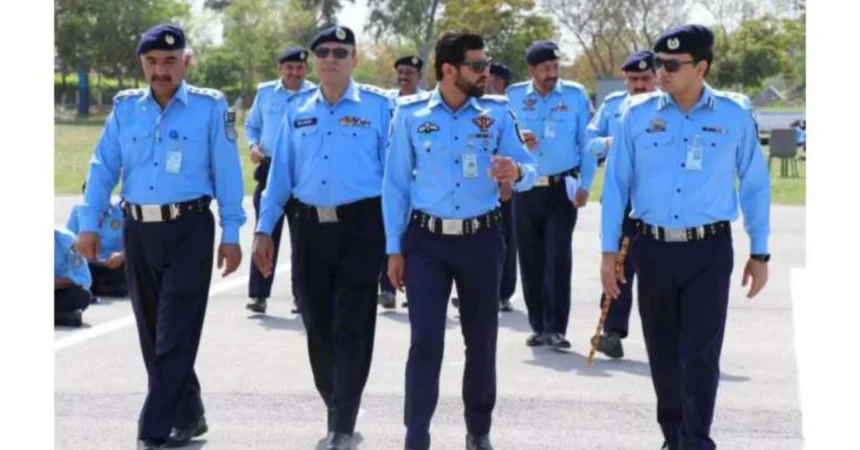In a significant restructuring move aimed at enhancing operational efficiency, the Islamabad police have appointed five inspectors to take on additional roles as Sub-Divisional Police Officers (SDPOs). This strategic decision reflects the police force’s commitment to improving public safety and ensuring better law enforcement across various sectors of the capital. The news was reported by 24NewsHD, and the official notifications for these appointments have already been issued.
Details of the New Assignments
The five inspectors assigned to the additional SDPO positions are as follows:
– **Inspector Muhammad Sarfraz** has been appointed as the **SDPO of Kohsar**. This area is characterized by residential neighborhoods and recreational spaces, necessitating effective law enforcement to maintain safety and community well-being.
– **Inspector Abdul Sattar** will take over as the **SDPO of Golra**. This region requires vigilant policing to address various local issues, including traffic management and community safety.
– **Inspector Ashiq Ali Manawar** has been designated as the **SDPO for the Secretariat** area, a hub for governmental activities and public administration, which demands a proactive approach to security.
– **Inspector Noor Islam** will serve as the **SDPO of Ramna**, which includes commercial areas and residential zones, highlighting the need for a robust police presence to ensure public safety.
– **Inspector Ashraf** phas been given the additional charge of SDPO of Tarnool, where effective law enforcement is crucial for addressing the challenges faced by the community.
Objectives Behind the Restructuring
The decision to appoint these inspectors as SDPOs aligns with the Islamabad police’s broader strategy to strengthen their leadership and operational capabilities. By placing experienced officers in critical roles, the police aim to enhance their responsiveness to community needs and improve overall public safety.
One of the primary objectives of this restructuring is to ensure that law enforcement is not just reactive but also proactive. Each SDPO will be responsible for overseeing police operations within their respective jurisdictions, enabling them to implement effective policing strategies tailored to the unique challenges of their areas.
Enhancing Community Engagement
An essential aspect of modern policing is community engagement. The Islamabad police recognize that building trust with residents is crucial for effective law enforcement. By assigning SDPOs who are familiar with their local areas, the police hope to foster stronger relationships with community members, encouraging cooperation and collaboration.
Community policing initiatives will likely become a focal point for the newly appointed SDPOs. This approach emphasizes understanding the concerns and needs of residents, enabling the police to address issues more effectively. Community meetings, outreach programs, and increased visibility in neighborhoods are expected to be part of the SDPOs’ strategies to engage with citizens.
Operational Challenges Faced by the Police
The Islamabad police, like many urban law enforcement agencies, face various challenges that impact their effectiveness. Issues such as crime rates, traffic congestion, and public disorder require ongoing attention and innovative solutions. By empowering inspectors to take on SDPO roles, the police are positioning themselves to tackle these challenges more effectively.
Crime Management
One of the most pressing concerns for law enforcement in Islamabad is managing crime rates. The capital, with its diverse population and increasing urbanization, has experienced various criminal activities, from petty theft to more serious offenses. The newly appointed SDPOs will be tasked with developing strategies to combat crime in their jurisdictions, utilizing data-driven approaches to identify hotspots and allocate resources efficiently.
Traffic Regulation
Traffic management is another critical area where the Islamabad police are focusing their efforts. The city faces significant congestion, and accidents are not uncommon. The SDPOs will play a vital role in ensuring traffic laws are enforced, and road safety is prioritized. This may include implementing traffic patrols, coordinating with local authorities, and organizing public awareness campaigns about road safety.
Public Order and Safety
Maintaining public order, especially during events and gatherings, is another challenge that the Islamabad police must address. The SDPOs will be responsible for coordinating security measures for public events, ensuring that law enforcement is visible and accessible to prevent potential disturbances and ensure a safe environment for all attendees.
The Role of Technology in Policing
In today’s digital age, technology plays a pivotal role in enhancing policing capabilities. The Islamabad police have recognized the importance of integrating technology into their operations. The newly appointed SDPOs will be expected to leverage technology to improve their efficiency and effectiveness.
Use of Data Analytics
Data analytics can significantly enhance crime prevention efforts. By analyzing crime patterns and trends, the police can identify areas that require increased patrols or specific interventions. The SDPOs will need to collaborate with data analysts to ensure they have access to the information necessary for making informed decisions about resource allocation.
Community Reporting Tools
The use of technology also extends to community engagement. Implementing mobile applications and online platforms for reporting crimes and safety concerns can empower citizens to actively participate in their community’s safety. The SDPOs can promote these tools, encouraging residents to report issues promptly and providing valuable data for law enforcement.
Surveillance and Monitoring
Surveillance technology, including CCTV cameras, can aid in monitoring public spaces and deterring criminal activity. The SDPOs will be responsible for ensuring that surveillance systems are effectively utilized and maintained, contributing to overall public safety.
Building a Culture of Accountability
For the Islamabad police to gain the trust of the community, a culture of accountability and transparency is essential. The SDPOs will play a crucial role in fostering this culture within their teams. Ensuring that officers adhere to ethical standards and maintain professionalism is vital for building public confidence.
Internal Oversight Mechanisms
Establishing internal oversight mechanisms can help monitor police conduct and ensure accountability. The SDPOs should prioritize training programs that emphasize ethical behavior and respect for citizens’ rights, reinforcing the importance of integrity in law enforcement.
Community Feedback
Encouraging community feedback on police activities can also enhance accountability. By creating channels for residents to voice their concerns or commendations regarding police interactions, the SDPOs can gain valuable insights into how their teams are perceived and where improvements may be needed.
Collaboration with Other Agencies
Effective policing often requires collaboration with other governmental and non-governmental agencies. The newly appointed SDPOs will need to build relationships with local organizations, social services, and community groups to address the root causes of crime and promote social cohesion.
Partnerships with NGOs
Non-governmental organizations (NGOs) often play a crucial role in community development and support. By partnering with these organizations, the Islamabad police can access resources and expertise that enhance their ability to address issues such as drug abuse, domestic violence, and youth delinquency.
Collaboration with Local Government
Collaboration with local government entities is equally important. Working together on community development initiatives can help create safer environments and address underlying social issues that contribute to crime. The SDPOs can facilitate these collaborations, ensuring that law enforcement is part of a broader community support network.
Training and Development for SDPOs
To equip the newly appointed SDPOs with the skills and knowledge necessary for their roles, ongoing training and development will be essential. The Islamabad police should prioritize professional development programs that address various aspects of modern policing.
Leadership Training
Given their new leadership positions, the SDPOs will benefit from leadership training programs that focus on effective management, decision-making, and conflict resolution. These skills are crucial for navigating the complexities of law enforcement and fostering positive relationships with their teams.
Community Policing Strategies
Training that emphasizes community policing strategies will help the SDPOs understand the importance of building relationships with residents. Programs that provide practical tools for engagement and communication will enhance their effectiveness in promoting public safety.
Public Perception of the Police Force
Public perception of the police plays a significant role in the effectiveness of law enforcement. The Islamabad police, under the leadership of the newly appointed SDPOs, have an opportunity to improve their image and foster trust within the community.
Transparency in Operations
Transparency in police operations is essential for building public trust. The SDPOs should prioritize clear communication with the community regarding police activities, successes, and challenges. Regular updates and open forums for discussion can help bridge the gap between law enforcement and residents.
Community Involvement
Encouraging community involvement in policing efforts can also enhance public perception. Initiatives that involve citizens in safety programs, neighborhood watch schemes, and community meetings can empower residents and demonstrate the police’s commitment to collaborative efforts.
Challenges Ahead
While the appointment of the new SDPOs brings hope for improved policing in Islamabad, several challenges remain. The evolving nature of crime, societal changes, and political dynamics can impact the effectiveness of law enforcement efforts.
Adapting to Changing Crime Trends
The nature of crime is constantly evolving, with new challenges arising from technological advancements and changing societal norms. The SDPOs will need to stay informed about emerging trends and adapt their strategies accordingly.
Navigating Political Pressures
Political pressures can influence policing decisions and complicate law enforcement efforts. The SDPOs must remain vigilant and committed to their duty to uphold the law, regardless of external pressures.
Looking Forward
The appointment of five inspectors as Sub-Divisional Police Officers signifies a proactive approach by the Islamabad police to enhance their operational capabilities and community engagement. As these officers step into their new roles, the expectations are high for them to make a positive impact on public safety and trust.
With a focus on community policing, effective resource management, and collaboration with local entities, the newly appointed SDPOs have the potential to transform the policing landscape in Islamabad. Their success will depend on their ability to address challenges, foster positive relationships with residents, and prioritize public safety.
As Islamabad continues to grow and evolve, the role of law enforcement will be more critical than ever. The efforts of the SDPOs will play a vital role in shaping the future of policing in the capital, ensuring that the community feels safe, supported, and connected to those who serve to protect them.
#IslamabadPolice #SDPOs #PublicSafety #CommunityPolicing #LawEnforcement #CrimePrevention #PoliceReform #PakistanPolice







